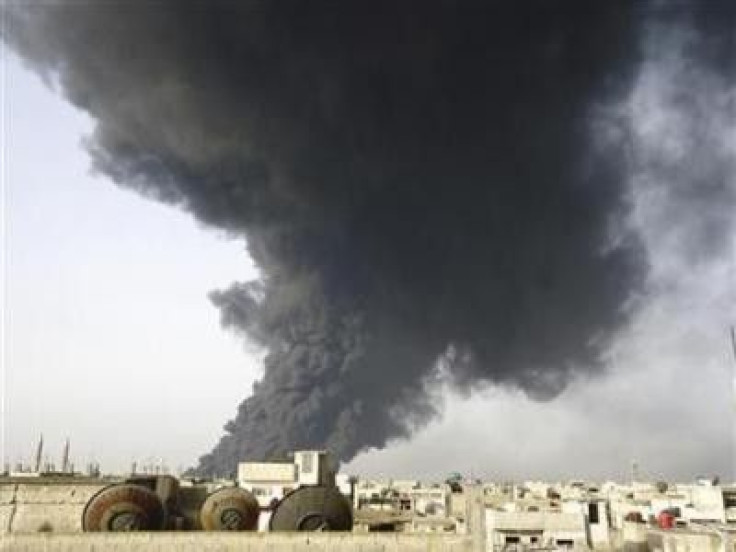Syrian Forces Attack Hama, Homs Despite Pressure to End Bloodshed

(REUTERS) - Syrian government forces launched an offensive on the city of Hama early on Wednesday, firing on residential neighborhoods from armored vehicles and mobile anti-aircraft guns, opposition activists said.
Syria
Troops also shelled Sunni Muslim neighborhoods in Homs, the 13th day of their bombardment of a city that has been at the forefront of the uprising against 42 years of rule by President Bashar al-Assad and his late father Hafez.
An explosion hit a major oil pipeline feeding a refinery in Homs, sending a large plume of smoke rising into the sky, witnesses said. The blast hit the pipeline near a district being shelled by government troops, they said.
France said it had created a one million euro emergency fund for aid agencies looking to help the Syrian people and would propose a similar one at an international level next week at a meeting in Tunisia to discuss the escalating crisis.
Paris had previously proposed humanitarian corridors with Syrian approval or with an international mandate for shipping food and medicine to alleviate civilian suffering.
Tanks deployed near the citadel of Hama were shelling the neighborhoods of Faraya, Olailat, Bashoura and al-Hamidiya, and troops were advancing from the airport, opposition sources said.
An activist called Amer, speaking briefly by satellite phone, said that landlines and mobile phone networks have been cut in the whole of Hama, a Sunni city notorious for the massacre of some 10,000 people when the present president's father Hafez sent in troops to crush an uprising there in 1982.
Activists said no casualty reports were available from Hama, Syria's fourth largest city, because of communications problems.
Assad's determination to crush the revolt, regardless of widespread condemnation of his use of force against civilians, prompted Arab countries led by Saudi Arabia to prepare a new resolution at the United Nations in support of a peace plan forged at a meeting in Cairo on Sunday.
A resolution passed at the meeting urged Arabs to provide all kinds of political and material support to the opposition. This included arms transfers, Arab League diplomats told |Reuters.
We will back the opposition financially and diplomatically in the beginning but if the killing by the regime continues, civilians must be helped to protect themselves. The resolution gives Arab states all options to protect the Syrian people, an Arab ambassador said in Cairo.
The head of Egypt's influential seat of Sunni Islamic learning, al-Azhar, called on Tuesday for bold Arab action against the Syrian government, raising regional pressure on Assad, a member of the minority Alawite sect, an offshoot of Shi'ite Islam, that has dominated Syria for five decades.
The threat of military support was meant to add pressure on the Syrian leader and his Russian and Chinese allies but it also risks leading to a Libya-style conflict or sectarian civil war.
Russia and China on February 4 vetoed a Western-Arab U.N. Security Council resolution that backed an Arab League call for Assad to step aside as part of efforts to end the bloodshed.
U.S. President Barack Obama told Chinese Vice President Xi Jinping on Tuesday, at a meeting at the White House, that the United States was disappointed with China's veto, an administration official said.
Chinese Vice Foreign Minister Cui Tiankai told reporters after the talks that China still supported the role of the Arab League and wanted inclusive dialogue to end the violence.
But he said the Security Council needed to take a very careful and very responsible attitude to Syria, adding that If the U.N. Security Council takes the wrong steps, that could lead to even worse bloodshed. He did not amplify his remarks.
Smuggled guns are already reaching Syria but it is not clear if Arab or other governments are behind the deliveries. Weapons and Sunni Muslim insurgents are also crossing into Syria from Iraq, Iraqi officials and arms dealers said.
Assad dismisses his opponents as terrorists backed by enemy nations in a regional power-play and says he will introduce reforms on his own terms.
The Syrian Observatory for Human Rights reported 20 people killed across Syria on Tuesday, including opposition supporters, civilians, and five government soldiers shot in clashes with rebel fighters in Qalaat al-Madyaq town near Hama.
Rallies by civilians, defying the crackdown, are one part of the uprising, but armed insurrection by the Free Syrian Army, mainly army defectors, is increasingly coming into play.
The government says at least 2,000 members of its military and security forces have died and the United Nations says government forces have killed several thousand civilians.
In Homs, a strategic city on the highway between Damascus and the commercial hub Aleppo, the pro-opposition district of Baba Amro was struck by shelling on Wednesday, activists said. At least six people were killed there on Tuesday, taking the city's estimated toll above 400 since the assault began on February3.
Foreign media have to rely on unverified activists' accounts because the Syrian government restricts access. But reports from neutral international organisations confirm a general picture of widespread violence.
An Arab League proposal that a joint Arab-U.N. peacekeeping mission be sent to Syria elicited a guarded response from Western powers, who are wary of becoming bogged down militarily in Syria. It was rejected out of hand by the Assad government.
Russia, Assad's main ally and arms supplier, also showed little enthusiasm, saying it could not support a peacekeeping mission unless both sides stopped the violence first.
The Syria conflict, one of a series of revolts in the Arab world which saw the leaders of Tunisia, Egypt and Libya toppled last year, is shaping up to be a geopolitical struggle reminiscent of the Cold War.
Russia wants to retain its foothold in the region and counter U.S. influence. Assad is also allied to regional Shi'ite power Iran, which is at odds with the United States, Europe and Israel.
© Copyright Thomson Reuters 2024. All rights reserved.











